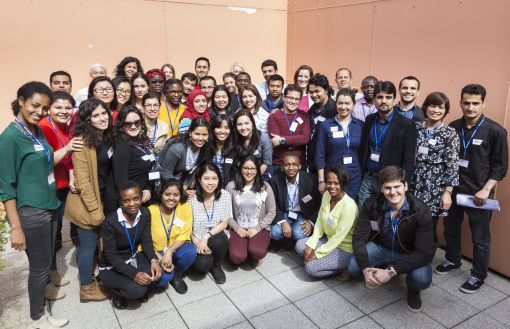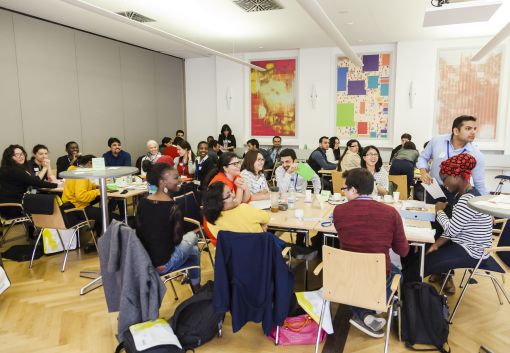When they think about returning to their home countries, students of the Development-Related Postgraduate Courses and the degree courses in the programme Public Policy and Good Governance have many questions: How do I find a job there? What is expected of me? In the search for answers, the DAAD hosted a network meeting in Bonn.
Representatives from 40 of the funded degree programmes came from all corners of Germany. Some had already met at a workshop here or there, but the majority did not know each other. The meeting in the DAAD centre gave them the opportunity to discuss their degree courses and network with the other scholarship holders in person– an activity from which new joint projects often emerge.
A get-acquainted game helped to break the ice before the students occupied themselves with the challenges of reintegration. “At the network meetings we rely on interaction and group work”, reported DAAD employee Julia Hillman. “Playful, joint discussions are the source of the best impulses.”
Concerns about a good job
In groups, the scholarship holders discussed what worried them when they thought about their return home. Although the participants come from countries as different as Kazakhstan and Argentina, their concerns were similar. The main fear is not being able to find an appropriate job. “Due to the high quality of education, we expect to find good jobs with correspondingly good pay”, says Sani Ruzzaman from Bangladesh. In Bonn, he represented the Master’s programme Hydroscience and Engineering at TU Dresden.
For Madina Mukhanova from Kazakhstan, the knowledge transfer and application is the central challenge. “After studying possible pathways to improve the energy and environmental sectors in developing countries in Germany, the main thing is to overcome the difficulties encountered in the way of implementation at home. And we should think about it now during the studies”, says the student in the programme Energy and Environmental Management. All students realise that it will not be easy to find a place in the system at home. Many see corruption and rigid hierarchies in their home countries as hurdles, as does the Kenyan Solomon Njogu who studies Land Management and Land Tenure at TU Munich.
Multifaceted help
Help for the scholarship holders comes from the Centre for International Migration and Development (CIM) (http://www.cimonline.de/en/index.asp). At the Bonn Network Meeting, employees presented their integration and placement services, including the “Top-Up”, a salary subsidy that the CIM pays to those who initially find only an internship or a poorly paid position upon returning home.
“We are well aware of the significance of the problem”, emphasised Head of Section Gabriele von Fircks, “that’s why we have chosen the topic reintegration once again for this network meeting. We want students to grapple with this issue as early as possible.”
The German Association of Postgraduate Programmes with special Relevance to Developing Countries (AGEP) is working closely on this point with the DAAD. At two AGEP integration workshops, in Bonn and Nairobi, alumni discussed their experiences with reintegration. The alumni network at these meetings, come into contact with potential employers, and provide impulses for concrete measures to better prepare students who are currently in the programme for reintegration.
Networks as inspiration
This thematic focus was well received by the scholarship holders in Bonn. “We all have different backgrounds, both professionally and geographically. Seeing that we still share similar concerns motivates us to look for joint solutions”, says Lucia Gallo from Argentina. Sani Ruzzaman added: “We bring a lot of points from these discussions back with us to our degree courses.”
Impressions from the workshop in our image gallery on facebook.







